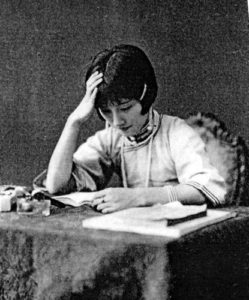Jernej Kusterle is a professor of Slovenian language, literature, and culture at the School of European Languages, Literature, and Culture at Beijing International Studies University. He writes in Slovenian, and his award-winning poems have been published in several national and foreign literary magazines. They have also been translated into languages such as English, Croatian, Serbian and Chinese, and are included in several anthologies. His poetry books include Poetical Freedom (2004), Neverending Fields of Digital Thoughts (2012), and Typescript: Genesis (2016). He is a president of the Slovenian Cultural-Artistic Club Artista, which organises the biennial Poetry Festival Verzionar, and has a major influence on the Slovene literary scene.
Garancija Ni Veljavna
V zibko polagam peteline
z zlomljenimi vratovi.
Zjutraj jih dam na vrvico
in jih peljem na sprehod.
Ne menim se za poglede,
ki me tlačijo v prisilni jopič.
Momljam si Chopina
in stopam v procesiji prividov.
Zvečer grem na pokopališče
razmišljat o življenju.
Moral bi umreti,
da bi z misli odrezal podivjane pse.
Ne… Ne še.
Ne bom se še zapustil!
Iz mesa si bom rezljal
okrogle otroške obrazke.
Ščipal jih bom za lička,
ker vem,
kako sam nisem prenesel
nasmehov protez,
ki so silili vame s tistim klišejskim:
»Buc, buc.«
Preklet naj bo dan,
ko so me iztrgali iz maternice.
Warranty is Void
I put down roosters with broken necks into the cradle.
In the morning I put them on a leash
and take them for a walk.
I don’t mind the stares
forcing me into straitjackets.
I murmur Chopin
and walk in the procession of ghosts.
In the evening I visit the cemetery
to think about life.
I would have to die
to sever the rabid dogs from my thought.
No… Not yet.
I won’t let myself go yet!
I will carve round childlike
faces from my flesh.
I’ll pinch their cheeks,
because I know
I could never bear
the prosthetic smiles
grinding into me with that trite
“cutesycute.”
Damn the day
they extracted me from the uterus.
~
Sneti Obraz
Odpeti prsno zadrgo pomeni živeti.
Razpreš si rebra in z roko sežeš k srcu,
stisneš ga v pest, zamenjaš z bobni,
žile potrgaš in po telesu napelješ kable.
Namesto pljuč namestiš membrane,
iztrgaš sapnik, v grlo vstaviš trobento.
Z jezika obrišeš patino;
in ti nisi več glasbenik temveč glasba.
To Cast off a Face…
To pull down the zipper on your chest is to live.
You part the ribs and reach for the heart,
clutch it in your fist and replace it with drums,
rip out your veins and riddle your body with cables.
You install membranes instead of lungs,
pluck out your windpipe and insert a trumpet in your throat.
You wipe the sheen from your tongue;
and you’re no longer a musician, you’re music.
Continue reading


